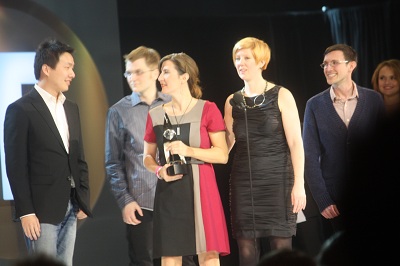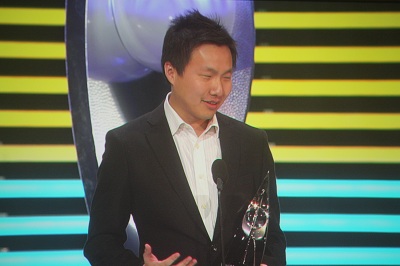LAS VEGAS — Jenova Chen got a letter from a 15-year-old girl named Sophia last month. She said that she had played Journey with her father before he died from an illness, and the game had changed her life.
“That letter made it all worth it,” said Jenova Chen, the cofounder of Thatgamecompany, which won game of the year last night for Journey at the DICE Summit. It’s a PlayStation Network downloadable title that’s unique among video games for its poetic ambiance and lack of violence and dialogue.
Chen talked about Sophia’s letter (attached at the end of story) at the close of a talk on emotions in games.
 Many participants, like Shuhei Yoshida, the head of Sony’s worldwide game studios, said that Chen’s talk was the highlight of the event and that it was more like an authentic confessional. Chen got a roar of applause when he was finished.
Many participants, like Shuhei Yoshida, the head of Sony’s worldwide game studios, said that Chen’s talk was the highlight of the event and that it was more like an authentic confessional. Chen got a roar of applause when he was finished.
He and his team also got a roar of applause when they won “game of the year” at the game industry’s equivalent of the Oscars, the peer-voted DICE Awards.
Journey, like Thatgamecompany’s Flower before it, was a rarity in a game industry full of violent content. The game depicts a being’s lonely journey to the top of a mountain and the spiritual change that takes place along the way. I played the game with my three daughters several times all the way through — something they’ve never done with a PlayStation 3 game (except Flower). Journey has no weapons or words, but it is full of emotion.
Journey’s unique in a business that has every kind of shooter game, but very little content such as romantic comedies, which are so plentiful in movies. The game was all the more remarkable in that it was made in about three years with a team of 13 people; major game projects typically employee a hundred or more.
In his talk and a subsequent interview, Chen revealed that not only is Journey a metaphor for life and death, it is also an apt description of the struggle that Los Angeles-based Thatgamecompany went through. During the process of shipping Journey, Thatgamecompany went bankrupt and had to idle its staff. If the team had shipped on time, they wouldn’t have had a polished game. It was a tough decision to delay it.

Chen said that the team was supposed to ship a year earlier than it did, and it had run out of money. The staff got by on half salaries for six months. When they shipped to Sony in January, the coffers were dry. The company ran out of money, gave everyone three-week vacations, and no one expected to come back.
Chief exec Kellee Santiago (in red) and designer Robin Hunicke (in black) both left the company. Chen stayed on in a minimal capacity. Eight of the company’s 13 employees eventually moved on to do something else.
But the story has a happy ending. Journey went on to become the best-selling PlayStation Network game of all time. Chen doesn’t know for sure, but presumably it will earn royalties. And Mitch Lasky, a general partner at Benchmark Capital, was so moved when he played Journey that he started talks to invest. Thatgamecompany raised $5.5 million, and it committed itself to making cross-platform games that deliver human emotion to a wider audience.
Last night, Chen won the ultimate vindication for delaying the launch of Journey. The company won eight awards out of 11 nominations, including the Best Game Director award for Chen and Game of the Year. We talked to Chen in an interview, and here is an edited transcript of the talk.
GamesBeat: Maybe you want to start with the ending of your talk, with this letter from Sophia and what it made you feel when it arrived.
Jenova Chen: Over the course of last year, we’ve been getting this kind of mail pretty consistently. I was quite moved by it early on. I think there were more than five or six people who’ve lost their family members. They contacted us to talk about how they were reminded of their passed-away family members in the game. By traveling with them, they were able to settle with their grief. Most of the mail was just along the lines of “It’s a wonderful game! I just wanted to tell you how great it is.” But very so often there’s a message that touches me, and I have to write back. I have to share it with everyone who worked on Journey. This happened to be one of the most recent ones. It’s January, so I still remember it.
 GamesBeat: Did you have a conversation with her then?
GamesBeat: Did you have a conversation with her then?
Chen: She’s 15. I wrote back to her. I think my e-mail was probably too theoretical, talking about how it’s not the worst thing, how life will be better. I didn’t hear back from her. I shared the e-mail with Sony, though. A lot of people were moved by it. They wanted to send her a poster or the collector’s edition of the game. I think that’s what happened.
GamesBeat: As you said, that’s exactly the kind of target that you had in mind for the emotional reaction to the game.
Chen: The mission statement of Thatgamecompany, after all these years, is that we want to create timeless interactive entertainment that makes positive changes to the human psyche. If our games can help people, that’s the best reward we can get. Hearing that girl saying the game helped make her life better is all the hard work paying off.

